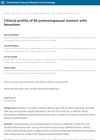 1 citations,
January 1986 in “Journal of Steroid Biochemistry”
1 citations,
January 1986 in “Journal of Steroid Biochemistry” Women with excessive hair growth or polycystic ovary disease may more often carry a gene variant for 21 hydroxylase deficiency.
 April 2019 in “International Journal of Research in Dermatology”
April 2019 in “International Journal of Research in Dermatology” Most women with hirsutism have mild symptoms and often experience acne, menstrual irregularities, and obesity.
 May 2006 in “Women's Health Medicine”
May 2006 in “Women's Health Medicine” Excessive hair growth in women, often from high androgen levels, is usually caused by PCOS, and can be treated with hair removal, medication, and possibly weight loss.
 286 citations,
January 2009 in “Human Reproduction Update”
286 citations,
January 2009 in “Human Reproduction Update” Women with the NIH type of PCOS have more obesity and higher risk of diabetes and heart disease than those with other types of PCOS.
 155 citations,
March 2006 in “The American Journal of Medicine”
155 citations,
March 2006 in “The American Journal of Medicine” Women with PCOS have heart-related issues not because of obesity, but due to insulin resistance and low adiponectin levels.
 76 citations,
January 2007 in “American Journal of Clinical Dermatology”
76 citations,
January 2007 in “American Journal of Clinical Dermatology” Women with PCOS often have skin problems like excessive hair, acne, hair loss, and dark patches, which can be treated with hormonal and non-hormonal therapies.
 69 citations,
November 2010 in “Middle East Fertility Society Journal”
69 citations,
November 2010 in “Middle East Fertility Society Journal” PCOS affects women's health by increasing the risk of diabetes, heart disease, and reproductive issues.
 68 citations,
January 2008 in “Seminars in reproductive medicine”
68 citations,
January 2008 in “Seminars in reproductive medicine” Women with PCOS often feel stigmatized and have mood issues, which can lower their sexual satisfaction, but proper treatment and support can help.
 51 citations,
November 2011 in “Reproductive Biology and Endocrinology”
51 citations,
November 2011 in “Reproductive Biology and Endocrinology” About 13% of women had idiopathic hirsutism and 8.5% had polycystic ovary syndrome in a group of Iranian women.
 42 citations,
June 2015 in “Gynecological Endocrinology”
42 citations,
June 2015 in “Gynecological Endocrinology” Women with PCOS often have mood disorders and a lower quality of life, and treatment should focus on both physical and mental health.
 33 citations,
October 1994 in “The Journal of Clinical Endocrinology and Metabolism”
33 citations,
October 1994 in “The Journal of Clinical Endocrinology and Metabolism” Finasteride reduces hair growth and is safe for women with excessive hair.
 32 citations,
January 1990 in “Clinical Endocrinology”
32 citations,
January 1990 in “Clinical Endocrinology” Women with female pattern hair loss have higher levels of certain androgens, suggesting increased androgen exposure to hair follicles.
 31 citations,
October 2005 in “British Journal of Dermatology”
31 citations,
October 2005 in “British Journal of Dermatology” Hair loss in women not always linked to increased oil production; other factors may be involved.
 29 citations,
February 2017 in “International Journal of Women's Dermatology”
29 citations,
February 2017 in “International Journal of Women's Dermatology” Women with excessive male-pattern hair growth should get a full hormone check-up to find and treat any underlying issues, considering both medical and emotional aspects.
 27 citations,
November 1998 in “Journal of Endocrinological Investigation”
27 citations,
November 1998 in “Journal of Endocrinological Investigation” Finasteride significantly reduces hair growth in women with idiopathic hirsutism.
 17 citations,
July 2003 in “Metabolism-clinical and Experimental”
17 citations,
July 2003 in “Metabolism-clinical and Experimental” Women with female-pattern baldness produce more testosterone, but 5a-reductase inhibition treatment won't help.
 17 citations,
February 1989 in “Fertility and sterility”
17 citations,
February 1989 in “Fertility and sterility” Cimetidine did not reduce hair growth in women with hirsutism.
 13 citations,
June 2018 in “Journal of Womens Health”
13 citations,
June 2018 in “Journal of Womens Health” Combination therapy with oral contraceptives and spironolactone improves hair growth, menstrual issues, and acne in women with PCOS.
 13 citations,
January 1995 in “Postgraduate medicine”
13 citations,
January 1995 in “Postgraduate medicine” Excessive hair growth in women can be harmless or signal serious health issues, and treatment often includes medication and hair removal, with noticeable results after 3-6 months.
 10 citations,
January 2003 in “Seminars in reproductive medicine”
10 citations,
January 2003 in “Seminars in reproductive medicine” The article explains how to identify and treat excessive hair growth in women, which can be distressing and may signal other health problems.
 10 citations,
December 1995 in “Journal of women's health”
10 citations,
December 1995 in “Journal of women's health” Finasteride reduces hair growth in women with hirsutism and works better with electrolysis.
 5 citations,
May 2019 in “Hormone and Metabolic Research”
5 citations,
May 2019 in “Hormone and Metabolic Research” Women with nonclassic 21-hydroxylase deficiency can have successful pregnancies through IVF, with certain factors affecting their chances.
 3 citations,
July 1993 in “Contraception”
3 citations,
July 1993 in “Contraception” Women with moderate body hair have higher levels of certain hormones and may benefit from treatment that increases sex hormone-binding protein.
 1 citations,
December 2022 in “Biomedicines”
1 citations,
December 2022 in “Biomedicines” Middle-aged women with PCOS often continue to experience symptoms related to high androgen levels, like unwanted hair growth.
 October 2023 in “International Journal For Multidisciplinary Research”
October 2023 in “International Journal For Multidisciplinary Research” Women with PCOS face many health risks, but exercise, a healthy diet, and weight management can help.
 June 2022 in “Journal of Education, Health and Sport”
June 2022 in “Journal of Education, Health and Sport” The paper reviews acne treatments for women with PCOS but doesn't give specific advice.
 January 2018 in “Biomedical Research (Aligarh)”
January 2018 in “Biomedical Research (Aligarh)” Women with early-onset baldness should be checked for early bone loss, but bone density doesn't change with baldness severity.
 226 citations,
September 2001 in “Journal of The American Academy of Dermatology”
226 citations,
September 2001 in “Journal of The American Academy of Dermatology” Hair loss in women is genetic, diagnosed by examination and biopsy, and treated with minoxidil, finasteride, or transplantation.
 192 citations,
September 2003 in “The Journal of clinical endocrinology and metabolism/Journal of clinical endocrinology & metabolism”
192 citations,
September 2003 in “The Journal of clinical endocrinology and metabolism/Journal of clinical endocrinology & metabolism” Metformin is effective for treating excessive hair growth in women with PCOS and may work better than the standard treatment in some ways.
 115 citations,
January 2001 in “American journal of clinical dermatology”
115 citations,
January 2001 in “American journal of clinical dermatology” Eflornithine cream effectively reduces women's unwanted facial hair but hair returns if treatment stops.






























